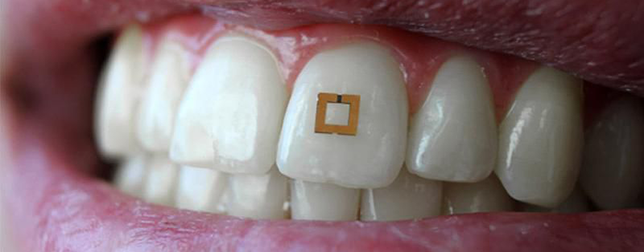High-tech wearables have become a part of our life. They are everywhere, from our wrists to our pets, and now, they are in our mouths!
Scientists from Tufts University have developed tiny sensors that attach to your teeth, and monitor your diet and health in real time. The sensor, when communicating wirelessly with a mobile device, can transmit information on glucose, alcohol and salt intake. Researchers note that future adjustments of these sensors could make them detect and record a wide range of chemicals, nutrients, and physiological states.
Read more Sweat-Based Wearable Sensor May Soon Replace Blood Tests
Previously marketed wearable devices for monitoring diet encountered obstructions such as bulky wiring, requiring the use of a mouth guard, or needing frequent replacement as the sensors quickly became corrupted. The Engineers at Tufts sought a more acceptable technology and created a sensor with a tiny 2mm x 2mm footprint that can easily adapt and bond to the uneven surface of a tooth. The sensors transmit their data wirelessly via an incoming radio frequency signal.
The sensors consist of three sandwiched layers: 1 central bioresponsive layer that absorbs chemicals or other nutrients, and an outer layer with 2 square-shaped gold rings. These 3 layers in combination act like a tiny antenna, transmitting the data to mobile devices, like smartphones or tablets.
While the material in the prototype is only sensitive to alcohol, glucose and salt, the researchers hope to modify it to detect a far wider range of nutrients and chemicals.
Read more Michael J. Fox Foundation’s Collaboration with Verily Aims to Deepen Understanding of Parkinson’s
“If you can evolve the sensor and engineer it to have a database of food consumption, then you could think about nutrition management,” says lead researcher Fiorenzo Omenetto, a professor of engineering at Tufts. “That could be reminding us that we’re indulging too much in sugar or something like that.”
The device could come in handy for diabetics, who need to monitor their sugar intake; the wearable could broadcast the information directly to their doctors. It could also help people with other medical conditions, such as patients with high blood pressure who need to watch their salt intake, or people suffering from celiac disease who cannot consume gluten.
The wearable could also possibly detect physiological states, such as changes in saliva – a symptom of gum disease. Or it could even detect chemical markers of fatigue, warning you that you are too tired to drive.
In reality, the sensor would be mounted on a back tooth so it is not seen. The front tooth was used to show off the technology, in Tufts’ press material.
The research is set to be published soon in the journal Advanced Materials.










